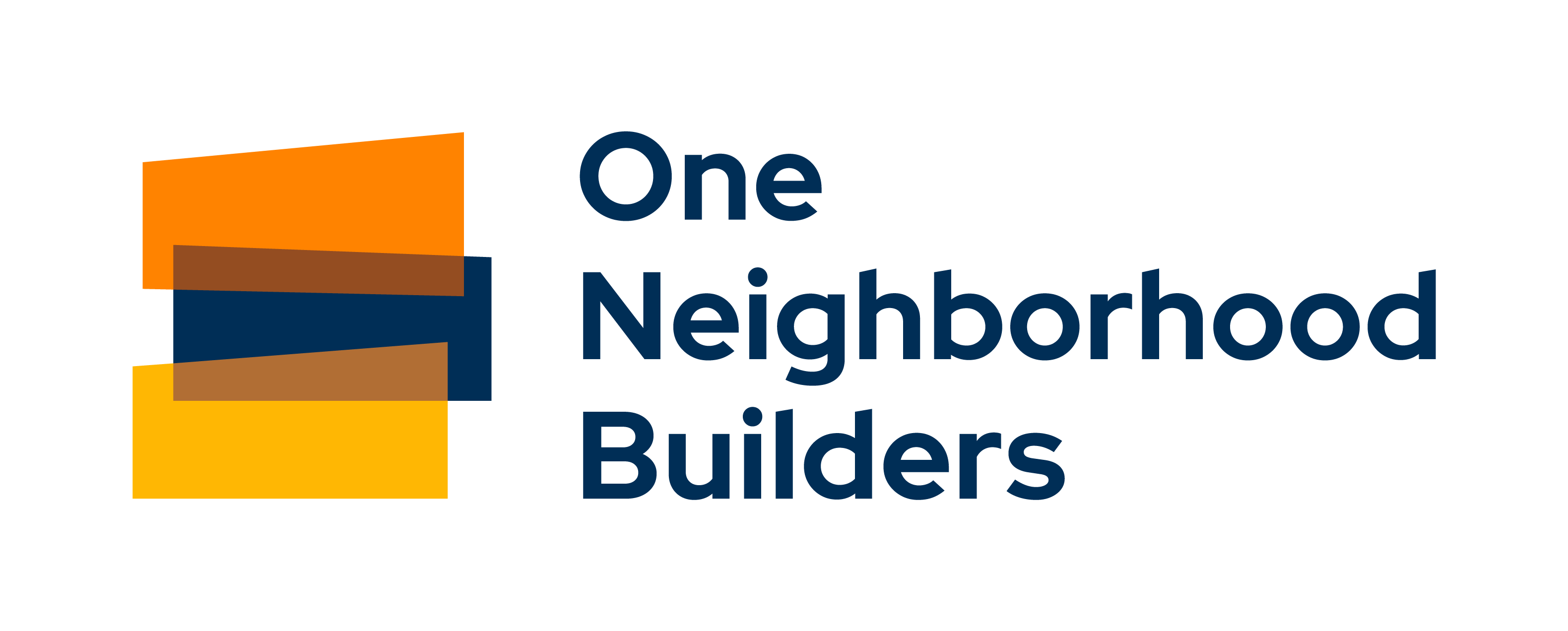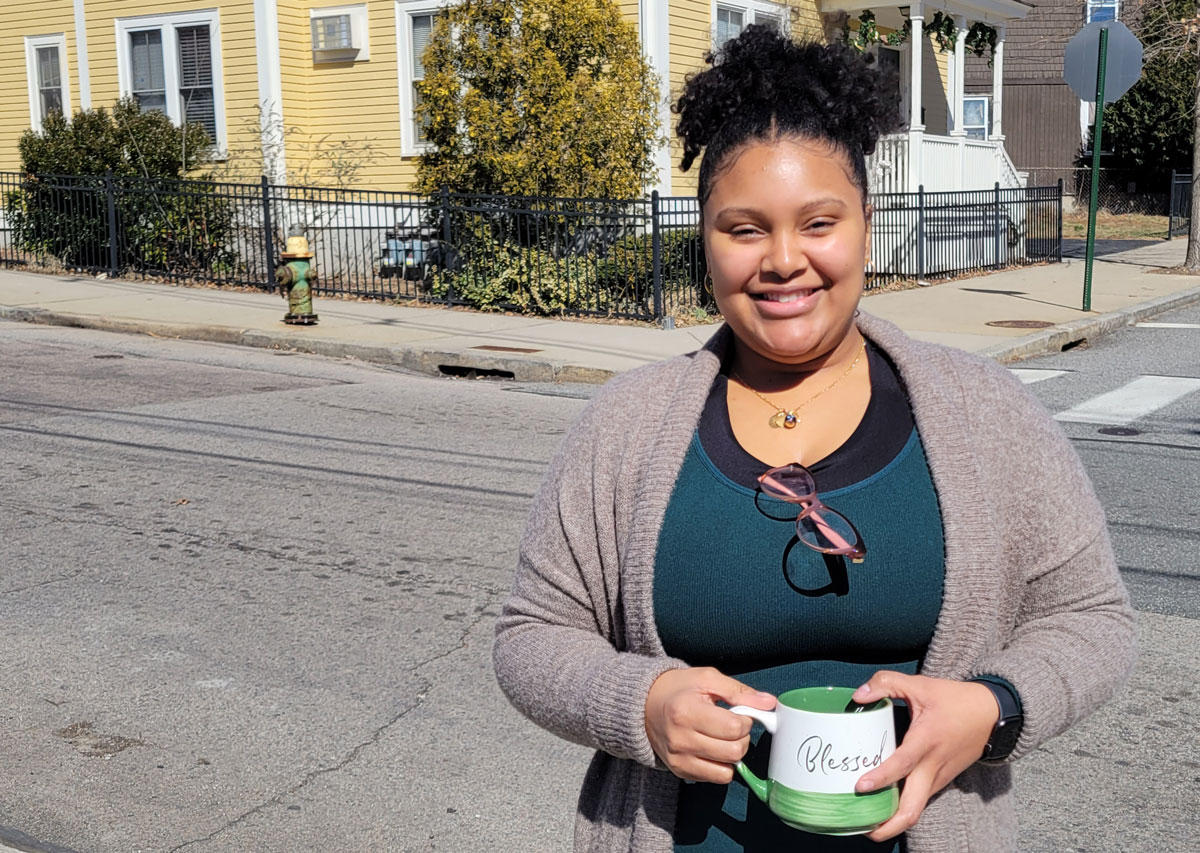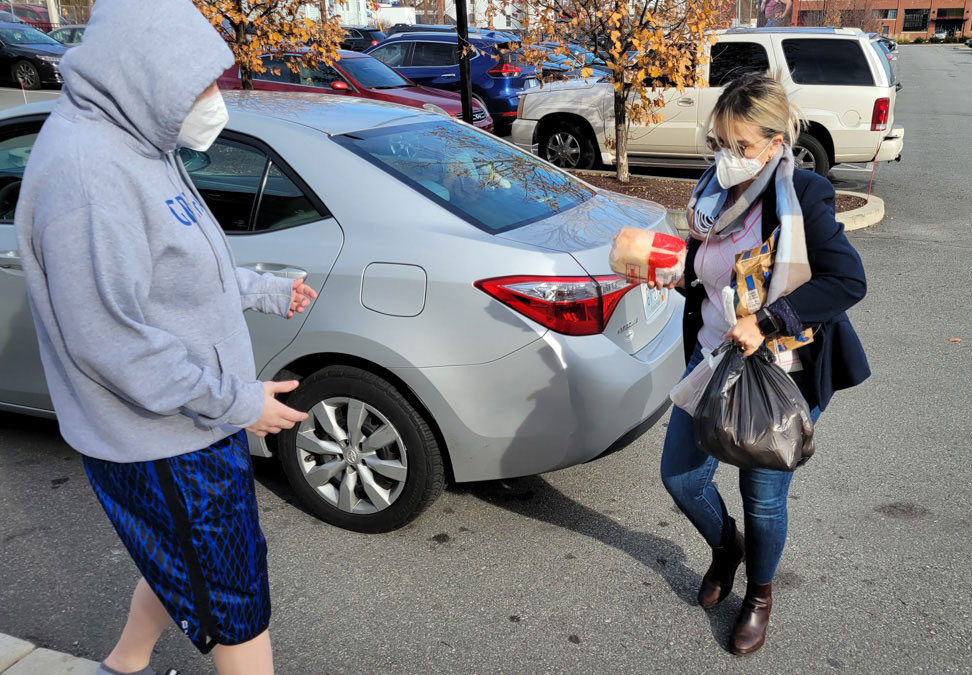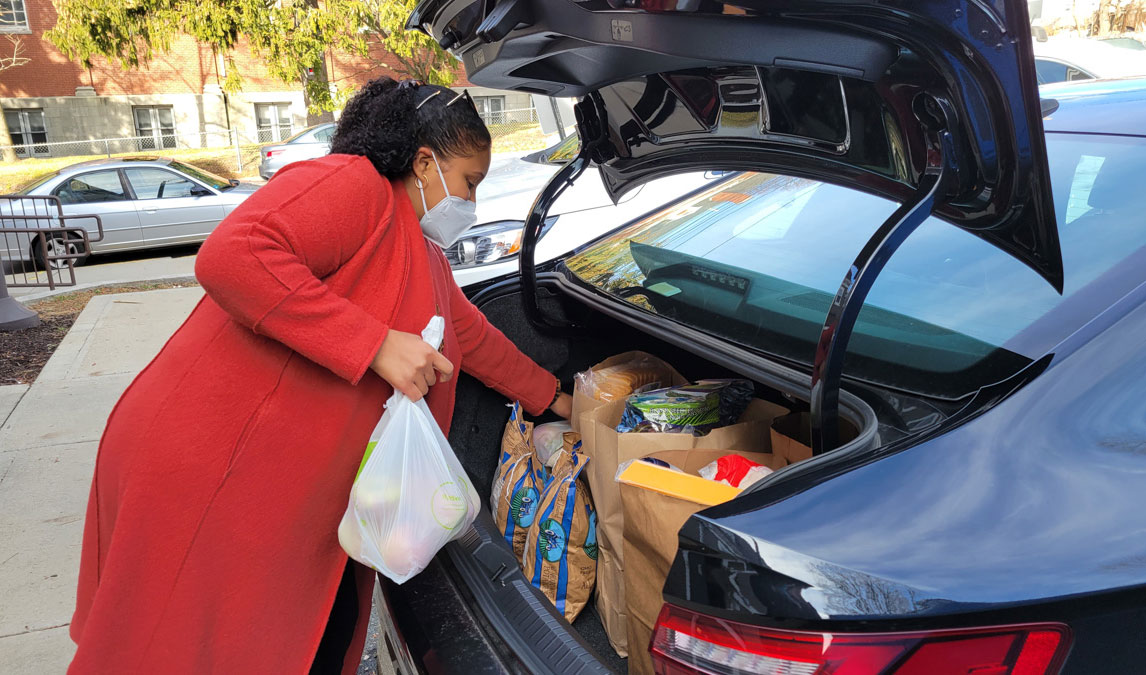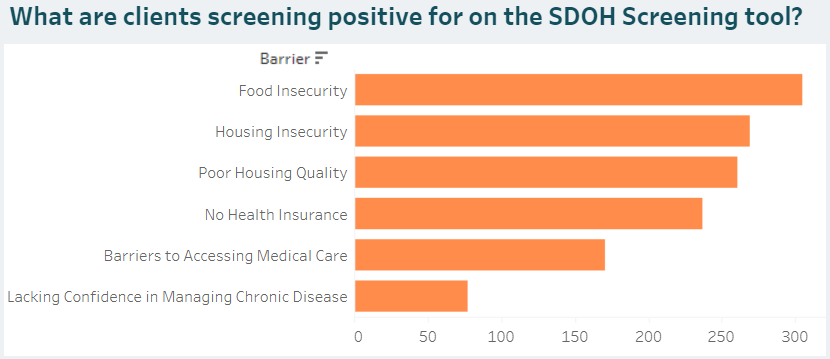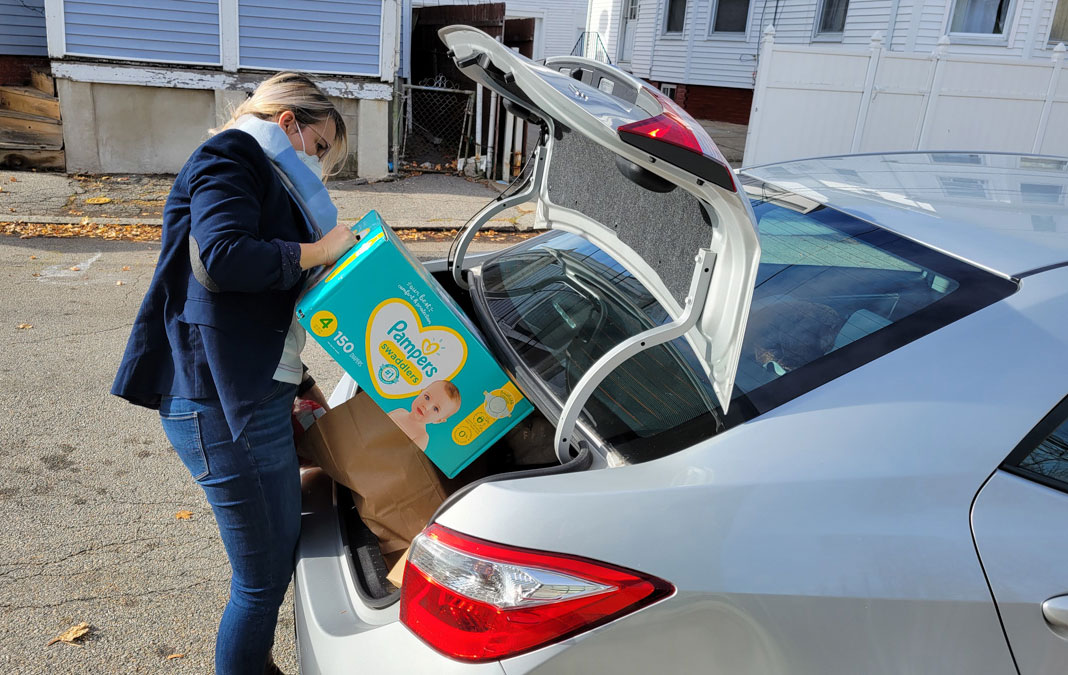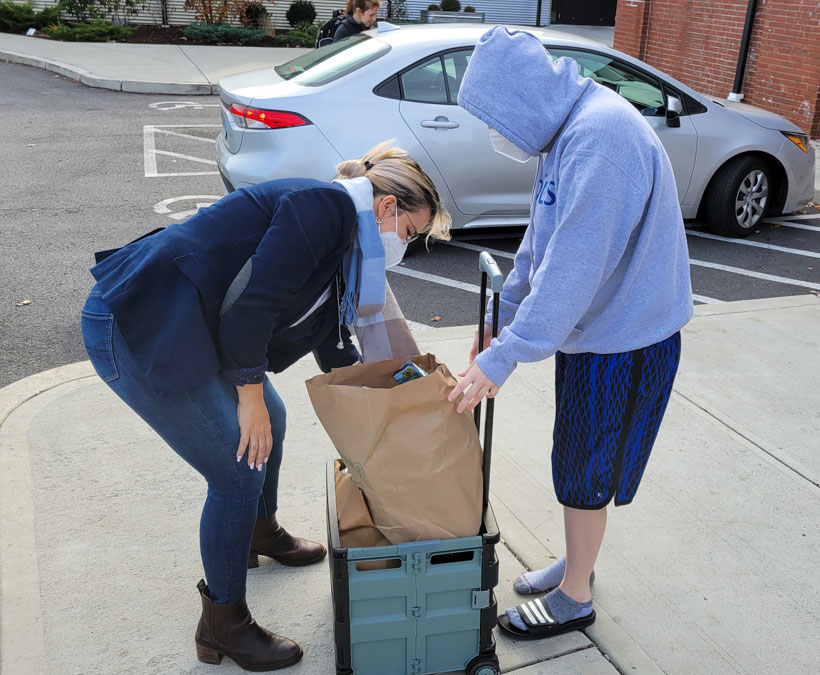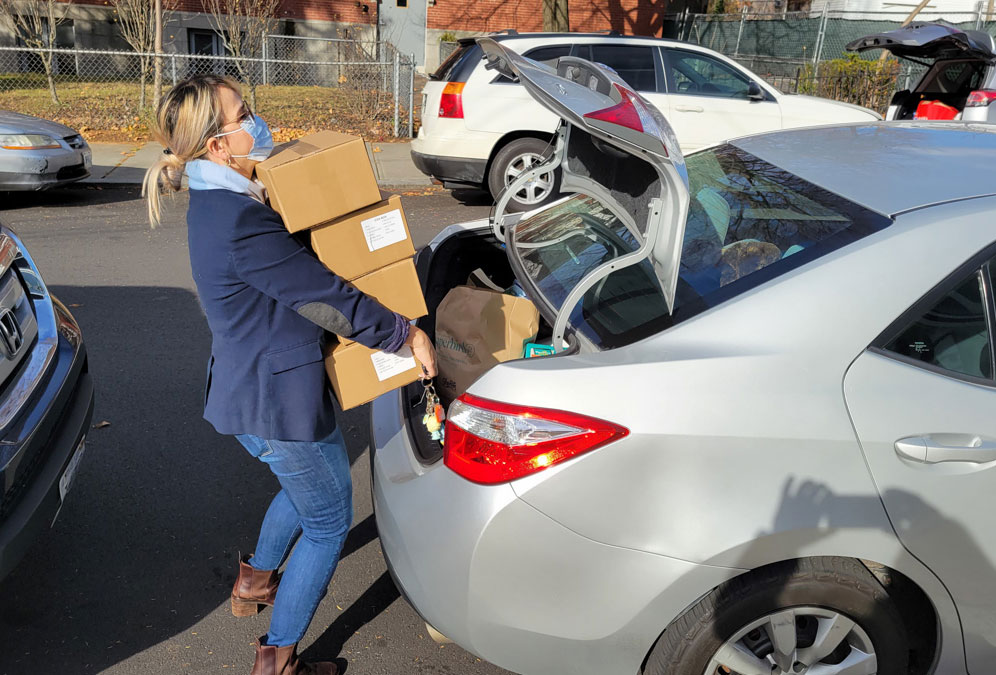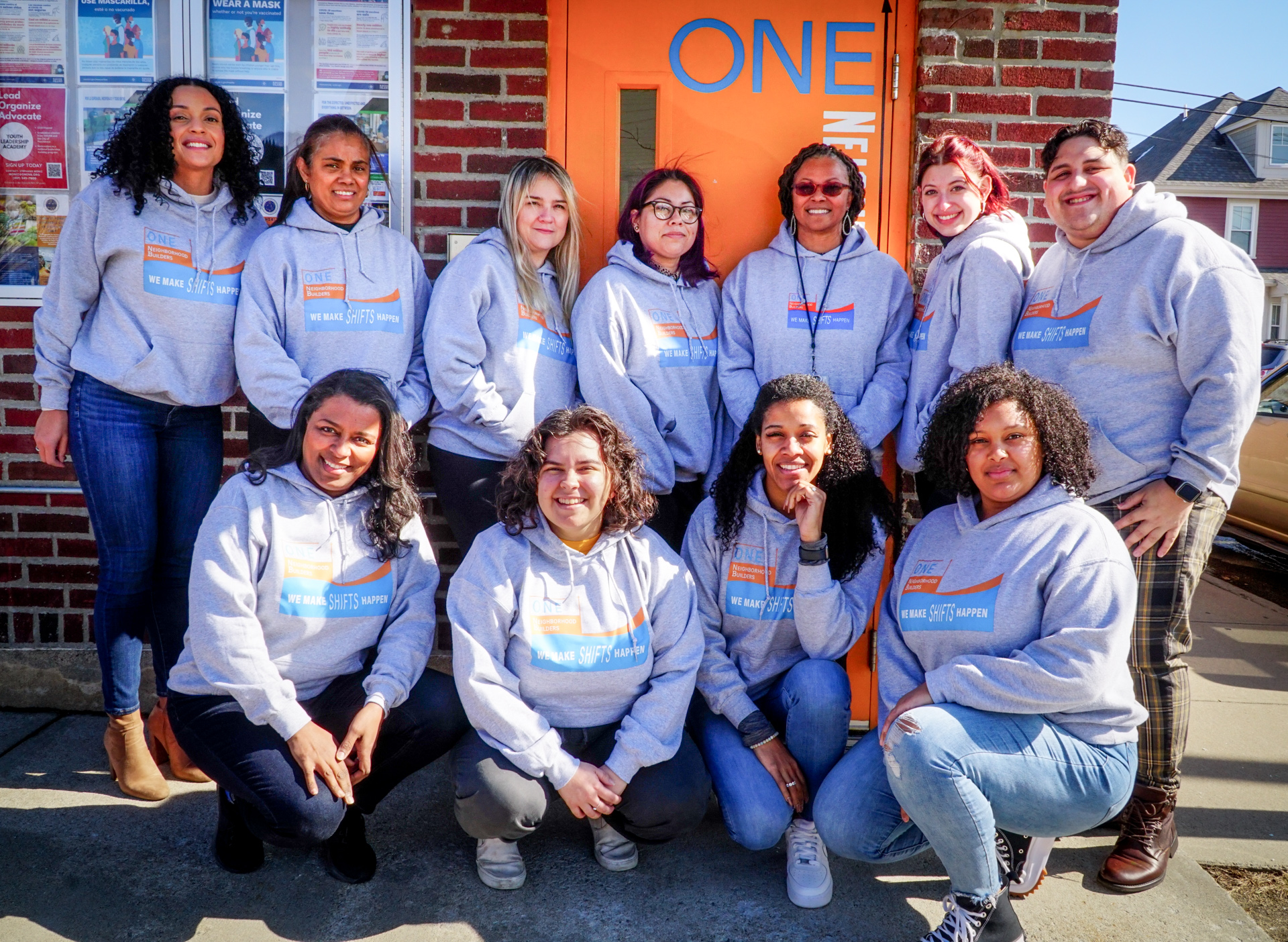
The Community Building Team at ONE Neighborhood Builders. From left, standing: Karen Zuniga, Assistant Director of Programs; Clara Diaz, Rent Relief Specialist; Claudia Hincapie, Community Health Worker; Wendy Sanchez, Resident Services Coordinator; Patricia Reaves, Rent Relief Supervisor; Lucy Berman, CPO Project Manager; and Dennis Hermida-Gonzalez, Community Health Worker Supervisor. From left, kneeling: Belinda Philippe, Director of Programs and Operations; Dominique Resendes, Assistant Director of Place-Based Initiatives; Martine Silva, Community Health Worker; and Stephanie Oliveira, Community Health Worker.
By Stephen Ide
ONE Neighborhood Builders
Stephanie Oliveira’s teacup is emblazoned with the word “blessed.”
The Community Health Worker, who has been with ONE Neighborhood Builders for a year, feels that way when she’s working with people every day.
“Every day is a good day, right?” she said.
The 29-year-old, raised by a single mom from Cape Verde, speaks Creole and Portuguese (and some Spanish). She tears up when thinking about the services she provides to people―services she wishes her mom, also a caregiver, had known about.
“She taught me a lot,” she said. “About how to care and feel from your heart. … it’s definitely not easy. Sometimes when you’re talking to clients, and you feel their energy, you feel that they’re [struggling].
“When I became a CHW, it made me wish I had known about all the resources available before so I could have helped my mom,” said Stephanie.
Claudia Hincapie, another Community Health Worker, has been with ONE|NB for less than a year and hopes to become a social worker someday.
She traces her story to when she was a 6-year-old in Colombia and helped her mother care for an elderly woman who had fallen nearby.
“It’s in my personality,” she says. “I feel compassion. … I think we are here in this life to help others.”
As Community Health Workers, Stephanie and Claudia were among those on the front lines during COVID-19 in Providence. But they are here year-round, connecting people to social and health services through understanding and compassion. Although it’s their job, but they do it because they love people.
With referrals from the Rhode Island Department of Health, Stephanie and Claudia joined other CHWs in the state delivering food to people stuck in quarantine.
“[It’s] not easy, because sometimes when you’re talking to clients, you feel their energy, and you know they’re going through it. Sometimes it can be overwhelming. And very, very stressful.”
—Stephanie Oliveira, Community Health Worker
During one recent outing, they picked up groceries from the Food Pantry to deliver to COVID shut-ins in Olneyville. On that day, Stephanie had four deliveries, packing the trunk of her compact car, and Claudia had only two that morning, but the diapers filled her trunk.
As CHWs, they not only deliver food. They bring personal protection items, test kits, masks, hand sanitizer, and knowledge about the services that can help people on the brink, and a compassion so sorely needed in these overwhelming times.
When they are not making house calls, they are fielding calls. And it’s their job to use a specialized state survey to assess social determinants of health (SDOH). The online form, through Unite Us, helps CHWs learn people’s needs based on their socioeconomic status, education, health-care access, and the neighborhood.
It helps Claudia and Stephanie determine whether someone not only needs COVID assistance, but whether they are in need of Rent Relief, food assistance through SNAP, help with paying their utilities, filing for health insurance, finding care for the uninsured, or even whether domestic violence assistance Is needed.
Since August 2020, ONE|NB has been tracking the number of people who have reached out to our CHWs in the 02908/02909 ZIP codes. They’ve faced a number of problems, with food insecurity topping the list:
There are 17 CHWs who make up the Central Providence Community Health Worker Consort as of this writing, some of whom have shifted into administrative roles but still are involved with clients. Caseloads for CHWs vary from 10 to 2,500 people, with an average of 482 clients, according to an evaluation report to the Rhode Island Foundation, the agency that provided $200,000 per year from 2019-2021 in its Fund for a Heathy Rhode Island: Central Providence Community Health Worker Initiative.
The CHWs at ONE|NB largely help clients in the 02908/02909 zip codes, but calls do come in from other locations. More than 20,000 people have gotten help from community health workers at ONE|NB and other partnered organizations, according to our COVID Dashboard.
For the community health workers, who work with people in need every day, it’s hard to not be affected.
“[It’s] not easy, because sometimes when you’re talking to clients, you feel their energy, and you know they’re going through it,” Stephanie says. “Sometimes it can be overwhelming. And very, very stressful.”
She has been moved by people who send her pictures of their neglected, roach-infested, or unsafe apartments.
For Claudia, work as a CHW began with her church more than two years ago, and she has since found herself working with the homeless, helping people at clinics, and helping immigrants get their bearings. Many find her via word of mouth, and she refers them to free or low-cost clinics, helps them understand documents, then follows up with them.
She often works with cases of domestic violence, referring people to Jonah House or other agencies for help.
Claudia already has earned certificates in cardiovascular disease/diabetes management and in adult mental health First Aid. In April, she finishes her studies at CCRI and expects to get a degree in social work from College Unbound before pursuing further studies.
But her biggest accomplishment becomes obvious, when she beams talking about her 23-year-old daughter, who clerks for a State Senator and will complete a remote degree in political science in May.
Stephanie, who at one time wanted to be a physical therapist or a nurse, found herself working in multiple environments – a nursing home, group home for people with dementia, and has been a home health-care aide.
“Being a CHW, it makes me happy because I always enjoy helping others,” Stephanie says, noting also that her work as a CHW and earning her CHW apprenticeship has been fulfilling. “I am growing… In life, there has to be some type of growth for you to fulfill your purpose. I’m a Christian woman and I believe I believe in growth and I believe in purpose.”
“I feel very blessed to be working here.”
It’s a feeling Claudia shares.
“Always smile,” she says. “You’ll feel better. For me, if you can smile and they look you in the eye, you can change life. That’s what I try to do.”
The CHW program is supported in part by the Rhode Island Foundation and Neighborworks America.
